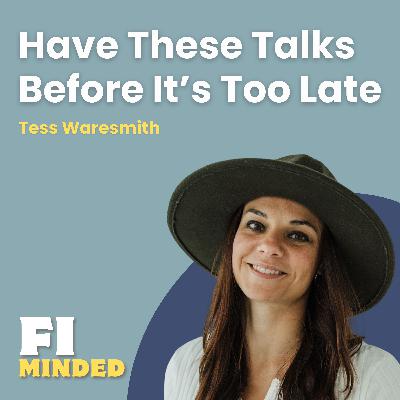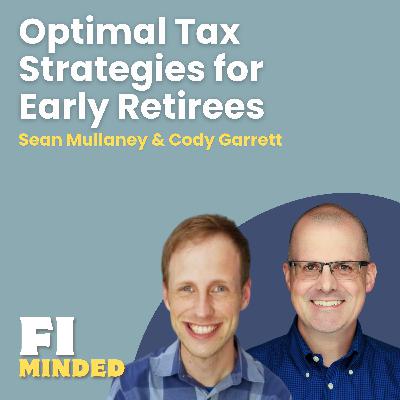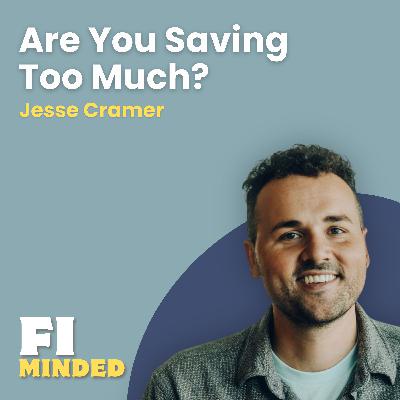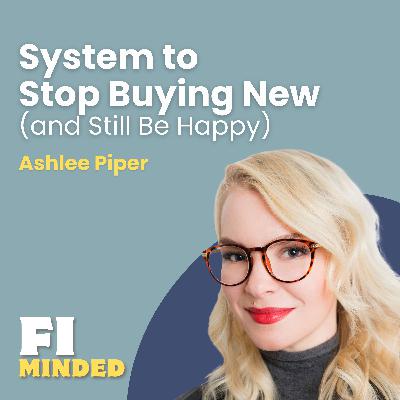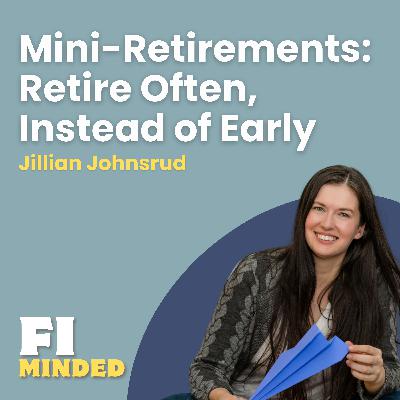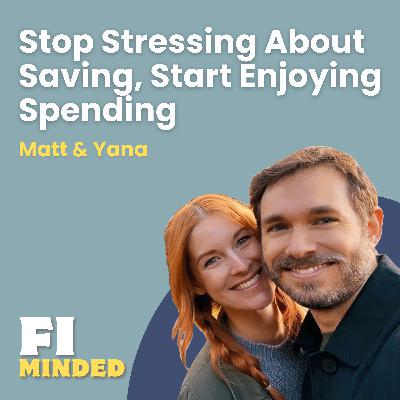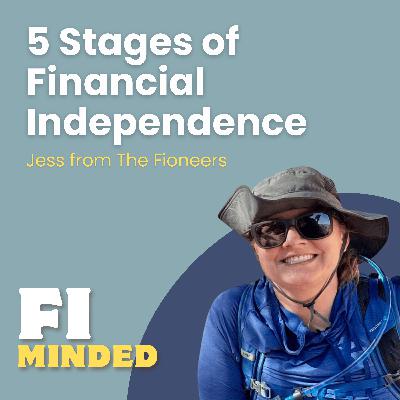Discover FI Minded: Achieve Financial Independence & Have Fun Doing It
FI Minded: Achieve Financial Independence & Have Fun Doing It

FI Minded: Achieve Financial Independence & Have Fun Doing It
Author: Justin Peters
Subscribed: 50Played: 1,023Subscribe
Share
© Copyright 2020 All rights reserved.
Description
Want to achieve Financial Independence (FI) without missing out on life?
FI Minded is the podcast for anyone seeking financial freedom, time freedom, and a work-optional lifestyle — all while enjoying the journey along the way.
Whether you’re at the beginning of your FI journey or already deep into Coast FI or Slow FI, this show gives you practical strategies and insights to reach early retirement and design a life that aligns with your values, purpose, and fulfillment.
Popular topics include:
- FI Optimization Strategies: Actionable advice to reach Financial Independence faster without unnecessary stress.
- Work Optional & Lifestyle Design: How to transition from the corporate grind and build a life of freedom, flexibility, and intentional living.
- Time Freedom & Coast FI: Making the most of your time while still planning for the future, including mini-retirements, travel, and other ways to enjoy your life now.
- Post-FI Identity & Purpose: What to do once you’ve achieved FI, and how to create meaning beyond money.
- Burnout & Balance: Avoid the pitfalls of over-optimization and learn to balance saving for the future with mental health and happiness.
If you want to reach financial independence, design a life that’s purposeful and fun, and avoid burnout along the way, FI Minded is your guide to building a sustainable, fulfilling, and free life.
Some of our past guests include Carl Jensen (1500 Days), Jeremy Schneider (Personal Finance Club), Nick Loper (Side Hustle Show), Andrew Giancola (The Personal Finance Podcast), Jordan Grumet (Earn & Invest), Rachael Camp (Work Optional), Jillian Johnsrud (Retire Often), Sean Mullaney (FI Tax Guy), Jill Sirianni (Frugal Friends), Jackie Cummings-Koski (Catching Up to FI), Joel Larsgaard (How to Money), Cody Garrett (Measure Twice), Jesse Cramer (Personal Finance for Long-Term Investors), Jess (The Fioneers), Chris Hutchins (All The Hacks), Diania Merriam (EconoMe), and many more inspiring voices in the FI space.
FI Minded is the podcast for anyone seeking financial freedom, time freedom, and a work-optional lifestyle — all while enjoying the journey along the way.
Whether you’re at the beginning of your FI journey or already deep into Coast FI or Slow FI, this show gives you practical strategies and insights to reach early retirement and design a life that aligns with your values, purpose, and fulfillment.
Popular topics include:
- FI Optimization Strategies: Actionable advice to reach Financial Independence faster without unnecessary stress.
- Work Optional & Lifestyle Design: How to transition from the corporate grind and build a life of freedom, flexibility, and intentional living.
- Time Freedom & Coast FI: Making the most of your time while still planning for the future, including mini-retirements, travel, and other ways to enjoy your life now.
- Post-FI Identity & Purpose: What to do once you’ve achieved FI, and how to create meaning beyond money.
- Burnout & Balance: Avoid the pitfalls of over-optimization and learn to balance saving for the future with mental health and happiness.
If you want to reach financial independence, design a life that’s purposeful and fun, and avoid burnout along the way, FI Minded is your guide to building a sustainable, fulfilling, and free life.
Some of our past guests include Carl Jensen (1500 Days), Jeremy Schneider (Personal Finance Club), Nick Loper (Side Hustle Show), Andrew Giancola (The Personal Finance Podcast), Jordan Grumet (Earn & Invest), Rachael Camp (Work Optional), Jillian Johnsrud (Retire Often), Sean Mullaney (FI Tax Guy), Jill Sirianni (Frugal Friends), Jackie Cummings-Koski (Catching Up to FI), Joel Larsgaard (How to Money), Cody Garrett (Measure Twice), Jesse Cramer (Personal Finance for Long-Term Investors), Jess (The Fioneers), Chris Hutchins (All The Hacks), Diania Merriam (EconoMe), and many more inspiring voices in the FI space.
189 Episodes
Reverse
If you’re great at saving money but feel anxious, guilty, or uncomfortable spending it, I want to share 4 spending principles that have helped me.Many people pursuing financial independence don’t struggle with discipline. They struggle with permission. We have endless advice on saving and investing, but far less guidance on how to actually enjoy the money we’re working so hard to build.In this episode, I’ll share my personal Spending Playbook: four spending principles I use as a super saver to spend confidently, reduce stress, and still stay on track toward financial independence. These principles are designed to help me enjoy my money without sabotaging my long-term goals.This isn’t about spending more; it’s about spending intentionally, so saving stops feeling like a sacrifice.The 4 Spending Principles Covered1. The Fun FundA simple way to give a portion of your money one clear job: enjoyment — without competing with your investing goals.2. The Oops BudgetA no-questions-asked buffer for unplanned, non-fun expenses so money doesn’t add stress during already stressful moments.3. The “Moments That Matter” ListA short list of life events and experiences where you pre-decide money won’t have an outsized influence on your choice.4. Guilt-Free Spending CategoriesA few high-impact categories where spending creates outsized happiness — and where under-spending isn’t necessarily a win.Key Takeaways:Being good at saving doesn’t automatically make spending easyGuilt around spending is often a permission problem, not a math problemPre-deciding how you’ll spend removes stress in the momentSpending rules can create freedom, not restrictionEnjoying your money is a skill you can practiceIntentional spending supports FI — it doesn’t sabotage itThe goal isn’t to spend more, but to spend with confidenceFinancial independence should make life feel bigger, not smallerOther Episodes You’ll Love:Smart Frugality: The Frugal Mindset That Actually Feels Good | E183 JC RodriguezIs Saving Too Much Holding You Back? | E179 Jesse CramerYou’re Financially Free, But It Doesn’t Feel Like It | E165 Shannah GameConnect With JustinEmail me at Justin@FIMinded.com or connect with me on LinkedIn.Support FI MindedWant to hear more? Follow FI Minded on your favorite podcast player.Like this episode? Share it with a friend pursuing financial independence.Love the show? Say thanks by leaving a positive review.
Everyone only gets 168 hours each week, and work quietly consumes the best of them. When careers sprawl into nights and weekends, health, relationships, and joy are usually the first things sacrificed. This conversation is about reclaiming time before burnout forces the decision for you, and proving that you don’t need full financial independence to start living with more freedom right now.Andy Hill shares how he and his wife redesigned their lives to work just 20–25 hours per week while still supporting their lifestyle and long-term goals. Through practical examples and mindset shifts, Andy breaks down what it really takes to transition away from a traditional five-day workweek without feeling reckless or irresponsible. The focus isn’t on escaping work. It’s on intentionally designing it.You’ll learn how CoastFI, part-time work, and solopreneur models can create flexibility long before you reach your FI number. This episode explores how to test reduced hours safely, set boundaries with employers or clients, and identify the moment when “more money” stops being the thing worth optimizing. If you’re craving more time but don’t want to derail your financial future, this is your blueprint.Key Takeaways:How to work fewer days without waiting for full financial independenceCoastFI can unlock flexibility long before retirementTime freedom is built gradually, not all at onceOne reclaimed day can transform how life feelsPart-time work can reduce burnout without killing progressClear boundaries protect your time and incomeSmall experiments lower the fear of cutting hoursShifting your priorities toward time and healthOther Episodes You’ll Love:Is Saving Too Much Holding You Back? | E179 Jesse CramerMini-Retirements: Retire Often, Not Just Early | E177 Jillian JohnsrudHow to Live a FI Life Without the FI Bank Account | E170 Jess from FioneersGuest Summary:Andy Hill is the creator of Marriage, Kids, and Money and the author of Own Your Time. After years of juggling a full-time job and a side hustle, Andy designed a solopreneur lifestyle that prioritizes time freedom while maintaining financial security. His work focuses on helping families align money with what matters most: time, flexibility, and intentional living.Check out Andy’s new book: Own Your TimeConnect With JustinEmail me at Justin@FIMinded.com or connect with me on LinkedIn.Support FI MindedWant to hear more? Follow FI Minded on your favorite podcast player.Like this episode? Share it with a friend pursuing financial independence.Love the show? Say thanks by leaving a positive review.
If you’ve ever felt stuck somewhere between the excitement of starting your FI journey and the reality that the finish line is still years away, this episode will give you a practical way to stay motivated. You’ll learn how a FI Bucket List can immediately add meaning, momentum, and enjoyment to the process—no matter where you are on the path. This isn’t about spending more money; it’s about intentionally creating experiences that keep you energized instead of burned out.You’ll also hear how shifting from a “save now, live later” mindset to a “design a meaningful life today” approach can completely change the way your journey feels. We break down how to choose bucket-list items that fit your values, your current season of life, and your budget. You’ll walk away with clear steps for creating your own version, whether you want more adventure, more connection, or simply more joy in your week.Finally, the conversation highlights what the FI Bucket List reveals about the bigger purpose behind financial independence: freedom, flexibility, and the chance to build a life you actually want to live. If you’ve been feeling behind, bored, or disconnected from your "why," this episode will help you reconnect with the possibility, purpose, and excitement that originally drew you to FI.Key Takeaways:Why a FI Bucket List is one of the most effective ways to stay motivated on a long FI journeyHow to design bucket-list items that fit your values, energy, and current season of lifeThe mindset shift from delaying joy to intentionally integrating it into your journeyHow to balance saving aggressively and creating meaningful experiences todayWhy your FI “finish line” isn’t the real point—and what actually matters moreHow a bucket list helps reduce burnout, boredom, and the fear of “doing FI wrong”Practical examples of small, low-cost wins that build excitement and momentumThe difference between running away from work and running toward a fulfilling lifeOther Episodes You’ll Love:Is Saving Too Much Holding You Back? | E179 Jesse CramerMini-Retirements: Retire Often, Not Just Early | E177 Jillian JohnsrudHow to Get the Courage to Travel More Adventurously | E174 Jon OteroConnect With JustinEmail me at Justin@FIMinded.com or connect with me on LinkedIn.Support FI MindedWant to hear more? Follow FI Minded on your favorite podcast player.Like this episode? Share it with a friend pursuing financial independence.Love the show? Say thanks by leaving a positive review.
Talking about end-of-life planning is one of the hardest conversations we’ll ever have, but also one of the most important. Whether you’re pursuing financial independence or already work-optional, someone in your life will eventually rely on you to make decisions on their behalf. And without clarity, that responsibility becomes emotionally heavy, financially stressful, and often filled with guesswork.In this episode, Financial Educator Tess Waresmith (Wealth With Tess) walks us through how to approach these conversations with compassion and confidence. Tess has navigated caregiving and loss firsthand, including the passing of her stepfather and aunt. She brings a personal and practical approach to preparing families for the future.You’ll learn how to make these conversations feel less overwhelming, how to use Tess’s 3-Layer Talk Framework to guide your discussion, and which estate-planning essentials every FI-minded person should have squared away. More than anything, this episode will help you strengthen connections, reduce uncertainty, and create peace of mind for yourself and the people you love.Key Takeaways:How to start end-of-life conversations in a way that feels natural, not heavyThe 3-Layer Talk Framework for discussing logistics, values, and legacyEssential estate-planning documents every family needs (Will, POA, Healthcare Directive)Questions that help uncover a loved one’s hopes, fears, stories, and wishesWhy acknowledging mortality can lead to more intentional spending, saving, and FI planningOther Episodes You’ll Love:3 Hidden Traps That Make FIRE Feel Empty | E182 Jordan GrumetHow to Negotiate Your Medical Bills | E161 Dr. Virgie Bright EllingtonDoes My FIRE Number Account for Inflation? | E140 Jesse CramerGuest Summary:Tess Waresmith is a financial educator, speaker, and the creator of Wealth With Tess, where she teaches women how to build confidence with money and investing. Through her workshops, courses, and content, she shares clear, compassionate financial guidance to help women reduce stress and prioritize what truly matters.Instagram: https://www.instagram.com/wealthwithtess/Talking About Death: https://www.moneyconfidentclub.com/talkdeathDeathly Yours Workbook ($60 off with code FIMINDED):https://www.moneyconfidentclub.com/offers/BkfzyzKV?coupon_code=FIMINDEDConnect With JustinEmail me at Justin@FIMinded.com or connect with me on LinkedIn.Support FI MindedWant to hear more? Follow FI Minded on your favorite podcast player.Like this episode? Share it with a friend pursuing financial independence.Love the show? Say thanks by leaving a positive review.
Are FI seekers supposed to follow the 50/30/20 budget guideline — or is it completely irrelevant when you’re pursuing financial independence? In this solo episode, Justin walks through five years of his own spending data to find out how closely his real-life budget aligned with this popular personal finance rule of thumb.You’ll learn what the 50/30/20 rule was originally designed for, where it breaks down for people on the path to FI, and how your own needs, wants, and savings ratios might shift as you move closer to financial independence. Justin also shares his FI-friendly version of the guideline that better supports intentional spending, lifestyle design, and long-term financial freedom.Whether you’re in your first year of the FI journey or optimizing for Coast FI, this episode will help you rethink your spending percentages, understand your true savings rate, and build a budgeting approach that matches your work-optional goals.Key Takeaways:Why the traditional 50/30/20 budgeting rule often breaks down for FI seekers, early retirees, and anyone aiming for financial independence.How Justin’s actual 2020–2025 spending data compared to the guideline — including needs, wants, and savings percentages.The difference between budgeting for traditional retirement vs budgeting for financial independence or Coast FI.What your savings rate reveals about your FI timeline and why it matters more than a fixed budget ratio.How an FI-minded spending framework can help you design a flexible lifestyle, reduce money anxiety, and stay aligned with your long-term goals.A simple FI version of the 50/30/20 rule you can adapt to your income, values, and personal financial independence path.Why intentional spending beats rigid budgeting - and how knowing your own numbers can help you reach work optionality faster.Other Episodes You’ll Love:Smart Frugality: The Frugal Mindset That Actually Feels Good | E183 JC RodriguezHow to Save Thousands on Groceries (Without Giving Anything Up) | E176 Bryan SuddithMoney Moves That Sound Smart…But Aren’t (Part 1) | E172Connect With JustinEmail me at Justin@FIMinded.com or connect with me on LinkedIn.Support FI MindedWant to hear more? Follow FI Minded on your favorite podcast player.Like this episode? Share it with a friend pursuing financial independence.Love the show? Say thanks by leaving a positive review.
Cutting costs can help you reach financial independence faster, but it shouldn’t come at the expense of your happiness. The real key is smart frugality: spending intentionally on what adds value and confidently cutting what doesn’t.In this episode, I’m joined by JC Rodriguez, financial coach and creator of The Frugal Rich, to explore how to build a values-based spending system that feels good, lasts long term, and supports your FI goals.We’ll unpack practical hacks from grocery savings to “buy for life” strategies and talk about how to balance conscious spending, frugality with purpose, and joy along the journey to financial freedom.If you’ve ever wondered whether saving money is helping or hurting your quality of life, this one’s for you.Key Takeaways:How values-based spending helps you save money without losing joyWhy cutting too far in the name of frugality can backfireSimple hacks to save money on everyday expenses like groceriesUse tools like CamelCamelCamel to track prices and shop smarterThe difference between short-term savings hacks and lasting frugal habitsWhy “buy for life” products often save more money long-termBalancing frugality with happiness in everyday spending decisionsWhy some people thrive on frugality while others struggle with itHow to spend confidently on big purchases without guiltHow to balance financial independence goals with living well todayGuest Summary:JC Rodriguez is a financial coach and creator of The Frugal Rich, a community of over 1.5 million people learning how to live better with less. His work helps people embrace frugality with purpose, adopt sustainable money habits, and build long-term financial freedom without sacrificing happiness.Check out JC on:YouTubeFacebook GroupConnect With JustinEmail me at Justin@FIMinded.com or connect with me on LinkedIn.Support FI MindedWant to hear more? Follow FI Minded on your favorite podcast player.Like this episode? Share it with a friend pursuing financial independence.Love the show? Say thanks by leaving a positive review.
FIRE was never meant to be the finish line. It was supposed to be the launchpad. But somewhere along the way, we started chasing optimization instead of meaning.In this episode, I sit down with Jordan Grumet (Doc G), author of The Purpose Code and host of the Earn & Invest Podcast, to explore how the FIRE movement can sometimes turn from a tool for freedom into a trap that leaves people feeling empty.We unpack three hidden pitfalls that can derail your FIRE journey and how to realign money, purpose, and meaning once you’ve “made it.”Jordan has been a longtime voice in the Financial Independence movement, through his blog, DiverseFI, his book, The Purpose Code, and his podcast, Earn & Invest.But after a decade in the movement, he started asking some deeper questions:Has FIRE become the destination instead of the launchpad?Are we optimizing our finances at the expense of meaning?And how do we bring purpose back into the FIRE movement?Key Takeaways:Why FIRE can accidentally make money the goal instead of the toolThe trap of “Perfect is the Enemy of Good” in personal financeEndless optimization (Roth timing, iBonds, chasing interest rates) can distract from what truly matters.How optimization can distract us from the hard emotional workReal fulfillment comes from pursuing purpose, not FIRE.What Jordan still loves about the FIRE movement (and what he’s outgrown)How to redefine success beyond spreadsheets and savings ratesOther Episodes You’ll Love:Is Saving Too Much Holding You Back? | E179 Jesse CramerHow to Live a FI Life Without the FI Bank Account | E170 Jess from FioneersFind Purpose Beyond Financial Independence | E157 Jordan GrumetGuest Summary:Jordan Grumet (Doc G) is a physician turned writer, speaker, and host of the Earn & Invest Podcast. His books, Taking Stock and The Purpose Code, explore how to align money, meaning, and legacy. Jordan has been part of the FIRE community since 2014, helping thousands rethink what financial independence really means.Connect with Jordan:Book: The Purpose CodePodcast: Earn & Invest PodcastConnect with Justin:Email me at Justin@FIMinded.com or connect with me on LinkedIn.Support FI Minded:Want to hear more? Follow FI Minded on your favorite podcast player.Like this episode? Share it with a friend pursuing financial independence.Love the show? Say thanks by leaving a positive review.
Everyone talks about starting a side hustle, but few talk about how to pick the right one. The one that fits your skills, your lifestyle, and your FI goals.Nick Loper, host of The Side Hustle Show, joins me again to share smart ways to find a side hustle that actually fits your life, skills, and Financial Independence goals.We explore creative frameworks like “Rip, Pivot, and Jam,” “Intersection,” and “Shovels in the Gold Rush,” and how to use AI tools like ChatGPT to uncover ideas faster than ever. Nick also shares how to narrow your list to just one idea you’ll be excited to work on for years to come.If you’ve been overthinking your next move or waiting for the “perfect” side hustle, this episode will help you find clarity, confidence, and direction.Key Takeaways:Find side hustle ideas at the intersection of what you love, what you’re good at, what people need, and what they’ll pay for.Use frameworks like Rip, Pivot, and Jam or Shovels in the Gold Rush to generate creative and practical ideas.Leverage AI tools like ChatGPT to brainstorm and refine your concepts.Ask questions like “Does this fit my lifestyle?” or “Would I still enjoy this in three years?” to narrow your choices fast.Other Episodes You’ll Love:How to Start a Side Hustle in One Month | E167 Nick LoperHow to DOUBLE Your Income in One Year | E164 Andrew GiancolaHow to Launch a Side Hustle While Working Full-Time | E132 Genuinely GenesisMore of Nick: The Side Hustle ShowMore of FI Minded:Email Justin at Justin@FIMinded.comConnect with Justin on LinkedIn: https://www.linkedin.com/in/justinleepeters/
It might have been monsters under the bed, shadows in the corner, or creepy dementors from Harry Potter. We all had irrational fears growing up.Mine was creepy dolls. After watching a movie called Teacher’s Pet, I became so terrified of dolls that my dad had my sister box up hers and store them in the basement.I’ll be honest, I’m still not a huge fan of dolls, but I’ve mostly outgrown that fear. Along the way, though, I’ve picked up some new ones like running out of money, being left without health insurance, and probably the biggest of all… taxes.I’ve been saving and investing with the fear that Uncle Sam will take a huge chunk of my money. That mindset has me padding my investment accounts and inflating my FI number. But after reading Sean Mullaney and Cody Garrett’s book, Tax Planning To and Through Early Retirement, I’m starting to rethink that - and I think you should too.To help us all navigate this, I invited Sean and Cody to walk us through strategies to optimize taxes before and during early retirement. We’ll cover things like which accounts to deplete first, how to control your taxable income through strategic selling, ways to minimize sequence-of-return risk, and even how you could pay almost nothing in taxes some years without cutting expenses.If you want practical strategies for optimizing taxes on your path to early retirement, this episode is for you.I hope you enjoy my conversation with Mr. Measure Twice and the FITaxGuy…Cody Garrett and Sean Mullaney.Key Takeaways:How to fund an early retirement lifestyle tax-free with drawdown strategies.Which investment accounts to tap first to optimize your retirement withdrawalsHow to sell specific brokerage lots to precisely manage taxes and cash flowA drawdown approach that protects against the sequence of returns risk in retirementHow to maximize ACA premium tax credits for affordable early retirement healthcareWhen to use Roth and HSA withdrawals for tax-efficient income flexibilityMentions:Selling Specific Lots in Fidelity: https://www.youtube.com/watch?v=Cft7dLLP7_U&feature=youtu.beMore of Sean & Cody:Check out the book “Tax Planning To and Through Early Retirement”:: https://www.measuretwicemoney.com/bookCody’s website: https://measuretwicefinancial.com/Sean’s website: https://fitaxguy.com/More of FI Minded:Email Justin at Justin@FIMinded.comConnect with Justin on LinkedIn: https://www.linkedin.com/in/justinleepeters/The discussion is intended to be for general educational purposes and is not tax, legal, or investment advice for any individual. Justin and the FI Minded podcast do not endorse Sean Mullaney, Mullaney Financial & Tax, Inc. and their services.
I’m in this strange in-between stage right now, somewhere between Coast FI and Full FI. And I often feel pulled back and forth between spender and saver, current me and future me, speeding up and slowing down. It’s a little exhausting, I have to admit.A few years ago, things felt simpler because I was in full accumulation mode. Most of my decisions came down to one thing: delay spending so I could save and invest more. Looking back, maybe I would’ve splurged a little on experiences or time-saving purchases, but honestly, I don’t regret much.These days, though, I’m learning to focus more on my current self. I’m loosening up, spending a bit more, and not being so uptight about every dollar. Talking with friends further along in the FI journey, I’ve realized this shift is pretty natural, and perhaps you’re experiencing it too.It’s not always easy, which is why I wanted to talk it through with a friend and frequent guest, Jesse Cramer. Jesse’s navigating the same changes himself, and as a financial advisor, he also brings perspective from helping clients through similar situations.In this episode, we dive into the balance of spending on your current self while still enjoying the growth of your investments. We talk about how we’ve loosened up around money habits like budgeting, and why we’re not stressing about hitting our exact FIRE numbers anymore.I always enjoy my conversations with Jesse, and if any of this resonates with you, I think you’ll get a lot out of this one too.I hope you enjoy my conversation with the host of The Personal Finance for Long-Term Investors Podcast… Jesse Cramer.Key Takeaways:Shift from always accumulating to finding balance and enjoying life now.Redefine “pay yourself first” to include meaningful spending today.Build a portfolio that grows in bull markets and feels safe in bear markets.Loosen up on strict budgeting without losing financial control.Let your spending evolve to reflect your values and priorities.Don’t let your FIRE number dictate every life decision.Factor in Social Security - you may be further ahead than you think.Learn from retirees: smooth transitions come from people and purpose.Take smart risks that push you beyond your comfort zone.More of Jesse:Check out Jesse’s podcast: https://bestinterest.blog/personal-finance-for-long-term-investors/More of FI Minded:Email Justin at Justin@FIMinded.comConnect with Justin on LinkedIn: https://www.linkedin.com/in/justinleepeters/
I was reviewing my spending for the first half of 2025 and noticed something interesting: excluding routine bills, groceries, and experiences, I only bought 25 new things this year, totaling about $1,400. For six months, that felt pretty solid. But it also got me wondering… could I go even further?That curiosity came to a head when the nozzle on my garden hose started leaking. My first instinct was to hop on Amazon and buy a new one. It was only $20. But then I paused. I looked up what might cause the leak and found out it’s usually a worn-out rubber washer. I took the thing apart, and sure enough, that was it. I hopped back on Amazon to order a new washer…until I remembered I had another broken nozzle in the garage. I swear I have the worst luck with these—but this one wasn’t leaking. I had just dropped it and snapped the trigger handle. I took the rubber washer from that one and used it to fix the current nozzle.And it worked! No money spent. Nothing added to a landfill. And honestly, I felt proud of myself.I share that story because it’s easy to assume we’re already frugal or intentional enough—especially in the FI community. But that moment made me realize how often I default to “buy new” without even questioning it. And I want to become more intentional, especially when it comes to physical things.That’s why I invited Ashlee Piper on the show today. Ashlee is a sustainability expert and author of the new book No New Things: A Radically Simple 30-Day Guide to Saving Money, the Planet, and Your Sanity. She’s also the creator of the #NoNewThings Challenge, which she personally followed for two years, which is just insanely impressive.In this conversation, we dig into how to creatively meet your needs without always reaching for your wallet. Ashlee shares her SUPER system for thoughtfully navigating purchases, and we run through a few real-life scenarios like getting ready for a wedding or gearing up for Halloween.If you want to bring more intentionality into how you consume, this episode will leave you feeling inspired.I hope you enjoy my conversation with the always resourceful, wildly entertaining, and sustainability-driven…Ashlee Piper.Key Takeaways:How to skip buying new without giving up what you loveA system to make smarter, more intentional buying choicesFind practical ways to fix, borrow, or swap before buying something newHow consumer culture encourages excess (and how to resist it)Balancing intentional spending and restrictionMore of Ashlee:Instagram: https://www.instagram.com/ashleepiper/Newsletter: https://substack.com/@theethicaleditMore of FI Minded:Email Justin at Justin@FIMinded.comConnect with Justin on LinkedIn: https://www.linkedin.com/in/justinleepeters/
We’re all waiting for the day we hit financial independence. That’s when we’ll finally quit our jobs and have time to learn a new hobby, start that house project, take longer vacations, or prioritize our health.You probably have a list of things you’re saving for after FI—but what if you don’t want to wait another decade to start? Tomorrow isn’t guaranteed. The challenge is that your career eats up most of your time and energy, and since you’re not financially independent yet, walking away isn’t an option.But what if you didn’t have to choose between all work now and all freedom later? What if you could work for a few years, take a break, then return to work—and repeat that cycle? Instead of one long career followed by one long retirement, what if you took mini-retirements along the way?It’s not just a theory—today’s guest has done it. Jillian Johnsrud has taken over a dozen mini-retirements throughout her life and now helps others do the same.In this episode, Jillian shares how to organize your time off, why some employers actually say yes to these breaks, and how a mini-retirement might even improve your career. She also provides examples of how mini-retirements speed up, rather than slow down, people’s path to FI.Mini-retirements are one of my favorite concepts—I’ve taken one myself, and I always encourage my friends to consider them too.So today, I’m making the case to you: maybe it’s better to retire often than to retire once.Key Takeaways:What a Mini-Retirement Actually Looks LikeHow to Plan a Mini-Retirement with PurposeA framework for organizing your mini-retirement using Jillian’s “Dream To-Do List”Signs It’s Time to Step AwayHow to Talk to Your Employer About Taking Time OffWhy some employers say yes to mini-retirements—and how to make your caseTips for framing the request in a way that shows mutual benefitMaking the Financial Trade-Off Worth ItSurprising ways mini-retirements can actually improve your career or lead to new income opportunities.Why “Retire Often” Might Be Better Than “Retire Once”More of Jillian:Read Retire Often: https://lnk.to/retireoftenMore of FI Minded:Connect with Justin on LinkedIn: https://www.linkedin.com/in/justinleepeters/
If you're on the path to financial independence, you know every dollar adds up. An extra $1,000 a year might not sound like much, but early in your FI journey, that kind of savings can seriously accelerate your timeline. And if you’re already FI, trimming $1,000 in expenses lowers your FIRE number and helps your nest egg last longer.The best part? I’m not asking you to start a side hustle or cut out your favorite purchases.Instead, we’re talking about saving money by wasting less, specifically, food waste.Yes, that’s right. The average American throws out over 200 pounds of food a year. For a family of four, that’s about $3,200 straight into the trash. Think wilted spinach, moldy bread, and forgotten leftovers. Any of this sound familiar?Here’s the good news: with a little planning and a few habit shifts, you can cut that waste dramatically and keep more money in your pocket without sacrificing lifestyle.Today’s guest, Bryan Suddith, took this challenge seriously. Over the last five years, he’s tracked every bit of food that ended up in his trash. And the total? Less than $100. For a family of four.We’ll share practical tips for meal planning, a framework for eating through your groceries, his favorite go-to food-waste saving meal (which surprised me), and even how to avoid food waste after hosting a party.If you’re ready to trim your grocery bill and stretch your FI dollars further without really sacrificing anything, then you’re going to like this episode.Key Takeaways:The impact of tracking your food wasteHow to avoid aspirational grocery purchasesWhich groceries to prioritize eating firstCreative ways to turn soon-to-expire food into tasty mealsA go-to food-waste-saving meal everyone will enjoyHow to cut down on food waste after hosting a partyWhat to know about food waste legislationMore of Bryan:Instagram: https://www.instagram.com/bryansuddith/More of FI Minded:Email Justin at Justin@FIMinded.comConnect with Justin on LinkedIn: https://www.linkedin.com/in/justinleepeters/
Today, we dive into some of the biggest questions our community has about money, relationships, and raising kids on the path to financial independence.Matt and Yana from CoastFI Couple share their honest experience with shifting from a strict save-only mindset to learning how to enjoy their money after reaching Coast FI.We talk about how even couples who agree on big-picture goals can still face daily money disagreements — and the tools and conversations that help keep things on track.Plus, we explore how to teach kids healthy money values without passing on anxiety or scarcity.Whether you’re struggling to spend guilt-free or want to raise money-smart kids, this episode offers practical insights and encouragement.If you have a question you'd like me to answer on a future episode, just shoot me an email at justin@fiminded.com.Key Takeaways:It’s totally normal to struggle with spending after years of saving.Start with small upgrades to ease into enjoying your money.You and your partner can be aligned overall and still clash on daily spending.Using tools and talking openly can help you avoid constant money arguments.You can teach your kids to be smart with money without making them anxious.Modeling a balanced approach helps your kids build confidence around money.More of Matt & Yana:YouTube: https://www.youtube.com/@CoastFICoupleQube Money: https://qubemoney.com/ (Use code COAST for a free trial)More of FI Minded:Connect with Justin on LinkedIn: https://www.linkedin.com/in/justinleepeters/
My first big trip abroad was in 2015. I had just graduated from college the week before and wanted to do something fun. So my girlfriend and I flew to Europe and visited Prague, Paris, and Barcelona. It was a blast, and it left a lasting impression. Since then, I’ve traveled to 10 more countries.Lately, I’ve been getting more comfortable with international travel, and I’m starting to feel the itch to push beyond my comfort zone. Up to this point, most of my trips have been to first-world countries, major metropolitan cities, and usually with a group of friends or my partner.But I’ll be honest, I’m a little nervous to push the boundary. That’s why I invited Jon Otero on the podcast to help me break through those fears and build the confidence to travel more adventurously.Jon is the definition of an adventurous traveler. He has visited 35 countries and all 50 U.S. states, and he has done some incredible things, such as riding a camel in Egypt, scuba diving to sunken ships, and paratriking in Peru. His fearless approach to travel is seriously so inspiring, and I’m hoping to tap into a little of that mindset myself.In this episode, we talk about everything from navigating language barriers and understanding cultural differences to safety tips, solo travel, and ideas for your next adventure.Before we jump in, I want to say this: adventurous travel is defined by you. If you’ve never left the country before, going anywhere new might feel like a big leap, and that’s awesome. Even exploring a new part of the U.S. can feel adventurous if you’ve never been out of your home state. Don’t let social media or someone else’s definition shape what a great trip looks like. Go at your own pace, and most importantly, have fun.Let’s get into it. I hope you enjoy my conversation with the adventurous traveler and host of The Globetrotters Podcast…Jon Otero.Key Takeaways:How to navigate language barriers when you don’t speak the local languageTips for learning cultural customs before your tripStaying aware without being overly paranoid while travelingMaking solo travel fun (and not lonely)How to pick your next travel destinationUnderrated countries that deserve a spot on your listMore of Jon:Listen to the Globetrotters Podcast: https://www.gtspodcast.com/More of FI Minded:Email Justin at Justin@FIMinded.comConnect with Justin on LinkedIn: https://www.linkedin.com/in/justinleepeters/
Some money moves sound smart…until you actually try them.This is Part 2 of our special series where six personal finance experts share strategies that sound smart but rarely are. In this episode, you’ll hear from:Larry McMahon (Uncontrollable Me) on why doing everything yourself can be a costly mistakeSean Mullaney (FI Tax Guy) on when Traditional 401(k) contributions might not be the best choiceJeremy Schneider (Personal Finance Club) on why whole life insurance is rarely the financial win it's pitched to beMissed Part 1? No problem - each episode stands alone, but you’ll want to go back and queue it up next.Key Takeaways:DIY-ing everything can limit your growth and lead to costly errorsTraditional 401(k) contributions aren’t always the most tax-efficient routeWhole life insurance rarely lives up to the hypeEven experienced money nerds make mistakes—and learn from themMore of Our Guests:Check out Larry’s coaching practice at https://www.uncontrollable.me/.Watch Sean’s YouTube channel at https://www.youtube.com/@SeanMullaneyVideos.Follow Jeremy’s Instagram account at More of FI Minded:Email Justin at Justin@FIMinded.comConnect with Justin on LinkedIn: https://www.linkedin.com/in/justinleepeters/DisclaimerThe content shared by Sean Mullaney in this episode is for informational purposes only and should not be considered tax advice for any specific individual. Neither this podcast nor its host endorses Sean Mullaney, Mullaney Financial & Tax, Inc., or any of the services they offer.
Some financial strategies sound really smart…until they aren’t.In part one of this special two-part series, we’re diving into real stories from personal finance pros who once made money moves that seemed like great ideas... but turned out to be anything but.You’ll hear honest reflections from:Diana Merriam (EconoMe) on the allure, and pitfalls, of credit card churningJesse Cramer (Personal Finance for Long-Term Investors) on rethinking Roth conversionsJoel Larsgaard (How to Money) on why 529 plans aren’t always the no-brainer they seemI’ll also share my own story of trusting the wrong financial “expert” and how it led me to open a whole life insurance policy I didn’t need.We’ve all made money moves we later questioned. This episode is here to help you learn from them and avoid making the same ones.Key Takeaways:Whole life insurance isn’t the wealth builder it’s often sold as.Credit card churning can be more trouble than it’s worth.Roth conversions aren’t always a smart tax move.529 plans can limit financial flexibility.Even smart-sounding strategies deserve a second look.Mistakes are part of the journey - learn and keep going.More of Our Guests:Check out Diana’s EconoMe Conference at https://economeconference.com/Listen to Jesse’s podcast Personal Finance for Long-Term Investors at https://bestinterest.blog/personal-finance-for-long-term-investors/Listen to Matt’s podcast How to Money at https://www.howtomoney.com/More of FI Minded:Email Justin at Justin@FIMinded.comConnect with Justin on LinkedIn: https://www.linkedin.com/in/justinleepeters/
The Financial Independence community is great at saving and investing — but what about giving?In this episode, I talk with Spencer Reese from Military Money Manual about how to make generosity part of your FI plan without derailing your financial goals. We explore how charitable giving can reduce your taxes, align with your values, and help you overcome money scarcity by building an abundance mindset.Whether you’re early in your FI journey or already financially independent, this conversation will help you give with purpose — and make a real difference along the way.Key Takeaways:How to get more comfortable donating your moneyWays to balance your FI goals while supporting causes you care aboutHow charitable tax deductions actually workWhat a Donor-Advised Fund (DAF) is and why it might be right for youThe easiest DAF platform for first-time donorsWhy donating appreciated stock can be a powerful giving strategyHow to find ethical, effective nonprofits to supportTips for deciding how much to give (and when)Whether it’s better to donate now or wait until you’ve reached FIMore of Spencer:Check out Military Money Manual Podcast: https://militarymoneymanual.com/podcast/More of FI Minded:Email Justin at Justin@FIMinded.comConnect with Justin on LinkedIn: https://www.linkedin.com/in/justinleepeters/
Why are you chasing financial independence?It could be living a more adventurous life filled with travel or doing work you love, regardless of the pay. Whatever your dream looks like, it probably comes down to two things: freedom and flexibility.We want to be in the driver’s seat of our lives. And we know money is one of the biggest obstacles standing in the way. So we save, invest, and make sacrifices now, hoping it’ll give us more control over our choices later.But let’s be honest, it can feel like a grind. And sometimes, we want to enjoy more freedom now, not just someday. So... is it possible to live a FI life without the FI bank account?Jess from The Fioneers says yes. As you move through your financial independence journey, you unlock more freedom. All of the freedom doesn’t magically happen after you hit your FIRE number; it happens along the way.In today’s episode, Jess breaks down the five stages of FI, what kind of freedom comes with each one, lifestyle shifts to consider, and common traps that could leave you stuck in one of the stages. Jess shares a lot of alternative paths to financial independence that balance enjoying the moment while setting up your future self.Let’s get into it. I hope you enjoy my conversation with the sourdough maker and pioneer of SlowFI…Jess from the Fioneers.Key Takeaways:How to use the incremental freedom you gain as you get closer to FIAdopting a SlowFI mindset5 stages of FIWhy you’ll spend less than you think in CoastFICreating memories in van lifeMore of Jess:CoastFI Calculator: https://thefioneers.com/free-resources/More of FI Minded:Email Justin at Justin@FIMinded.comConnect with Justin on LinkedIn: https://www.linkedin.com/in/justinleepeters/
What would you do if you had to start over, completely from scratch?In this episode, I share the wild true story of Audrey, a woman who vanished in 1962 and was just found alive, 63 years later. Her story sparked a thought experiment: if you had to reinvent yourself, new city, new career, new hobbies, what path would you choose?We’ll explore what reinvention could look like through the lens of financial independence. I also share a sneak peek from my upcoming interview with Jillian Johnsrud and reflect on the passions and missed opportunities that still tug at me.More of FI Minded:Email Justin at Justin@FIMinded.comConnect with Justin on LinkedIn: https://www.linkedin.com/in/justinleepeters/





